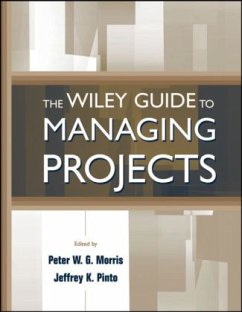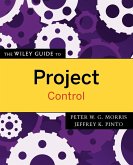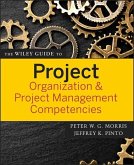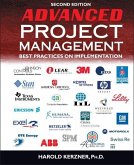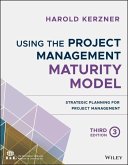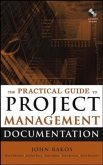Jeffrey K. Pinto, Peter W. G. Morris
The Wiley Guide to Managing Projects
Herausgeber: Morris, Peter W G; Pinto, Jeffrey K
Jeffrey K. Pinto, Peter W. G. Morris
The Wiley Guide to Managing Projects
Herausgeber: Morris, Peter W G; Pinto, Jeffrey K
- Gebundenes Buch
- Merkliste
- Auf die Merkliste
- Bewerten Bewerten
- Teilen
- Produkt teilen
- Produkterinnerung
- Produkterinnerung
The complete guide to making project management work in any organization The Wiley Guide to Managing Projects presents business and engineering managers with fundamental concepts, techniques, and practices they need to identify how project management fits into their organizations and how to successfully apply this knowledge on the job. Starting at an introductory level, this work explains project management fundamentals along with the core areas of project planning, risk, value, and control. The Wiley Guide to Managing Projects goes well beyond other project management guides through extensive…mehr
Andere Kunden interessierten sich auch für
![The Wiley Guide to Project Control The Wiley Guide to Project Control]() Peter MorrisThe Wiley Guide to Project Control87,99 €
Peter MorrisThe Wiley Guide to Project Control87,99 €![The Wiley Guide to Project Organization & Project Management Competencies The Wiley Guide to Project Organization & Project Management Competencies]() The Wiley Guide to Project Organization & Project Management Competencies86,99 €
The Wiley Guide to Project Organization & Project Management Competencies86,99 €![Advanced Project Management Advanced Project Management]() Harold R. KerznerAdvanced Project Management131,99 €
Harold R. KerznerAdvanced Project Management131,99 €![Using the Project Management Maturity Model Using the Project Management Maturity Model]() Harold KerznerUsing the Project Management Maturity Model102,99 €
Harold KerznerUsing the Project Management Maturity Model102,99 €![Intelligent Fault Diagnosis and Prognosis for Engineering Systems Intelligent Fault Diagnosis and Prognosis for Engineering Systems]() George VachtsevanosIntelligent Fault Diagnosis and Prognosis for Engineering Systems206,99 €
George VachtsevanosIntelligent Fault Diagnosis and Prognosis for Engineering Systems206,99 €![The Practical Guide to Project Management Documentation The Practical Guide to Project Management Documentation]() John RakosThe Practical Guide to Project Management Documentation112,99 €
John RakosThe Practical Guide to Project Management Documentation112,99 €![Service Science Service Science]() Robin G. QiuService Science152,99 €
Robin G. QiuService Science152,99 €-
-
-
The complete guide to making project management work in any organization The Wiley Guide to Managing Projects presents business and engineering managers with fundamental concepts, techniques, and practices they need to identify how project management fits into their organizations and how to successfully apply this knowledge on the job. Starting at an introductory level, this work explains project management fundamentals along with the core areas of project planning, risk, value, and control. The Wiley Guide to Managing Projects goes well beyond other project management guides through extensive coverage of program and portfolio management, project procurement, learning and knowledge management, and technology management. The Wiley Guide to Managing Projects is the largest collection of project management information and material available in one source. This book's contributors are among the most recognized international leaders in the field and bring with them a wealth of experience and insight from industry, consulting, and academia. The Wiley Guide to Managing Projects is a comprehensive, authoritative "owner's manual" to managing projects for corporate managers, program and project managers, team members, consultants, academics, and students.
Hinweis: Dieser Artikel kann nur an eine deutsche Lieferadresse ausgeliefert werden.
Hinweis: Dieser Artikel kann nur an eine deutsche Lieferadresse ausgeliefert werden.
Produktdetails
- Produktdetails
- Verlag: Wiley & Sons
- Seitenzahl: 1440
- Erscheinungstermin: 27. September 2004
- Englisch
- Abmessung: 241mm x 196mm x 55mm
- Gewicht: 2295g
- ISBN-13: 9780471233022
- ISBN-10: 0471233021
- Artikelnr.: 12965416
- Herstellerkennzeichnung
- Libri GmbH
- Europaallee 1
- 36244 Bad Hersfeld
- gpsr@libri.de
- Verlag: Wiley & Sons
- Seitenzahl: 1440
- Erscheinungstermin: 27. September 2004
- Englisch
- Abmessung: 241mm x 196mm x 55mm
- Gewicht: 2295g
- ISBN-13: 9780471233022
- ISBN-10: 0471233021
- Artikelnr.: 12965416
- Herstellerkennzeichnung
- Libri GmbH
- Europaallee 1
- 36244 Bad Hersfeld
- gpsr@libri.de
PETER W. G. MORRIS, PhD, is Professor of Construction and Project Management at University College London. He is also Executive Director of INDECO Ltd. and a past vice president and chairman of the Association for Project Management and past vice chairman of the International Project Management Association. He is the author of many papers and books on project-based management, including The Anatomy of Major Projects and The Management of Projects. JEFFREY K. PINTO, PhD, is the Samuel A. and Elizabeth B. Breene Professor of Management in the Sam and Irene Black School of Business at Penn State Erie. He is the author or coauthor of numerous articles and fifteen books, including The PMI Project Management Handbook, What Made Gertie Gallop?, and Successful Project Managers (all published by Wiley).
Preface.
Introduction.
SECTION I: INTRODUCTION TO SECTION I: KEY ASPECTS OF PROJECT MANAGEMENT.
1. Control (Peter Harpum).
2. Qualitative and quantitative risk management (Stephen J. Simister).
3. Project Management Structures (Erik Larson).
4. An Overview of Behavioral Issues in Project Management (Dennis P. Slevin
and Jeffrey K. Pinto).
SECTION II: THE MANAGEMENT OF PROJECTS.
SECTION II:1. STRATEGY, PORTFOLIO AND PROGRAM MANAGEMENT.
5. Project Success (Terry Cooke-Davies).
6. Management of the Project-Oriented Company (Roland Gareis).
7. Strategic Business Management through Multiple Projects (Karlos A. Artto
and Perttu H. Dietrich).
8. Moving From Corporate Strategy to Project Strategy (Ashley Jamieson and
Peter W.G. Morris).
9. Strategic Management: The Project Linkages (David I. Cleland).
10. Models of Project Orientation in multi-project organizations (Joseph
Lampel and Pushkar. P.Jha).
11. Project Portfolio Selection and Management (Norm Archer and Fereidoun
Ghasemzadeh).
12. Program Management: A Strategic Decision Management Process (Michel
Thiry).
13. Modeling of Large Projects (Ali Jaafari).
14. Managing Project Stakeholders (Graham M Winch).
15. The Financing of Projects (Rodney Turner).
16. Private Finance Initiative and the management of projects (Graham Ive).
SECTION II.2: TECHNOLOGY MANAGEMENT.
17. Requirements Management in a Project Management Context (Alan M. Davis,
et al.)
18. Design Management (Peter Harpum).
19. Concurrent Engineering for Integrated Product Development (Hans J.
Thamhain).
20. Process and Product Modeling (Rachel Cooper, et al.).
21. Managing Configurations and Data for Effective Project Management
(Callum Kidd and Thomas F Burgess).
22. Safety, Health and Environment (Alistair Gibb).
23. Verification (Hal Mooz).
24. Managing Technology: Innovation, Learning and Maturity (Rodney Turner
and Anne Keegan).
SECTION II.3: SUPPLY CHAIN MANAGEMENT AND PROCUREMENT.
25. Integrated Logistic Support and all that - a review of through-life
project management (David Kirkpatrick, et al.).
26. Project Supply Chain management - optimizing value the way we manage
the total supply chain (Ray Venkataraman).
27. Procurement: Process Overview and Emerging Project Management
Techniques (Mark E. Nissen).
28. Procurement Systems (David Langford and Mike Murray).
29. Contract Management (David Lowe).
30. Tender Management (George Steel).
31. Project Changes: Sources, Impacts, Mitigation, Pricing, Litigation &
Excellence (Kenneth G. Cooper and Kimberly Sklar Reichelt).
SECTION II.4: CONTROL.
32. Time and Cost (Asbjorn Rolstadas).
33. Critical Chain Project Management (Lawrence P. Leach).
34. Project Performance Measurement (Daniel M. Brandon).
35. Making risk management more effective (Stephen Ward and Chris Chapman).
36. Value Management (Michel Thiry).
37. Improving Quality in Projects and Programs (Martina Huemann).
38. The Project Management Support Office (Martin Powell and James Young).
SECTION II.5: COMPETENCE DEVELOPMENT.
39. Contemporary Views on Shaping, Developing and Managing Teams (Connie L.
Delisle).
40. Leadership of Project Team (Peg Thoms and John J.Kerwin).
41. Power, Influence and Negotiation in Project Management (John M. Magenau
and Jeffrey K. Pinto).
42. Managing Human Resources in the Project-Oriented Company (Martina
Huemann, et al.).
43. Competencies: Organizational and Persona (Andrew Gale).
44. Projects: learning at the edge of organization (Christophe N.
Bredillet).
45. The validity of knowledge in project management and the challenge of
learning and competency development (Peter W.G. Morris).
46. Global Body of Project Management Knowledge and Standards (Lynn
Crawford).
47. Lessons Learned: Project Evaluation (J. Davidson Frame)
Chapter 48. Developing Project Management Capability - Benchmarking,
Maturity, Modeling, Gap Analyses, ROI Studies (C. William Ibbs, et al.).
49. Project Management Maturity Models (Terry Cooke-Davies).
SECTION III: APPLICATIONS IN PRACTICE.
50. How Projects Differ, And What to Do About It (Aaron J.Shenhar and Dov
Dvir).
51. Managing New Product Development Projects (Dragan Milosevic).
52. Pharmaceutical Drug Development Project Management (Janet Foulkes and
Peter W.G. Morris).
53. Project Management in the Defense Industry (John F. Roulston).
54. Project Management in the construction Industry (Peter W.G. Morris).
55. Project Management in the Automotive Industry (C. Midler and C.
Navarre).
56. Professional Associations and Global Initiatives (Lynn Crawford).
Index.
Introduction.
SECTION I: INTRODUCTION TO SECTION I: KEY ASPECTS OF PROJECT MANAGEMENT.
1. Control (Peter Harpum).
2. Qualitative and quantitative risk management (Stephen J. Simister).
3. Project Management Structures (Erik Larson).
4. An Overview of Behavioral Issues in Project Management (Dennis P. Slevin
and Jeffrey K. Pinto).
SECTION II: THE MANAGEMENT OF PROJECTS.
SECTION II:1. STRATEGY, PORTFOLIO AND PROGRAM MANAGEMENT.
5. Project Success (Terry Cooke-Davies).
6. Management of the Project-Oriented Company (Roland Gareis).
7. Strategic Business Management through Multiple Projects (Karlos A. Artto
and Perttu H. Dietrich).
8. Moving From Corporate Strategy to Project Strategy (Ashley Jamieson and
Peter W.G. Morris).
9. Strategic Management: The Project Linkages (David I. Cleland).
10. Models of Project Orientation in multi-project organizations (Joseph
Lampel and Pushkar. P.Jha).
11. Project Portfolio Selection and Management (Norm Archer and Fereidoun
Ghasemzadeh).
12. Program Management: A Strategic Decision Management Process (Michel
Thiry).
13. Modeling of Large Projects (Ali Jaafari).
14. Managing Project Stakeholders (Graham M Winch).
15. The Financing of Projects (Rodney Turner).
16. Private Finance Initiative and the management of projects (Graham Ive).
SECTION II.2: TECHNOLOGY MANAGEMENT.
17. Requirements Management in a Project Management Context (Alan M. Davis,
et al.)
18. Design Management (Peter Harpum).
19. Concurrent Engineering for Integrated Product Development (Hans J.
Thamhain).
20. Process and Product Modeling (Rachel Cooper, et al.).
21. Managing Configurations and Data for Effective Project Management
(Callum Kidd and Thomas F Burgess).
22. Safety, Health and Environment (Alistair Gibb).
23. Verification (Hal Mooz).
24. Managing Technology: Innovation, Learning and Maturity (Rodney Turner
and Anne Keegan).
SECTION II.3: SUPPLY CHAIN MANAGEMENT AND PROCUREMENT.
25. Integrated Logistic Support and all that - a review of through-life
project management (David Kirkpatrick, et al.).
26. Project Supply Chain management - optimizing value the way we manage
the total supply chain (Ray Venkataraman).
27. Procurement: Process Overview and Emerging Project Management
Techniques (Mark E. Nissen).
28. Procurement Systems (David Langford and Mike Murray).
29. Contract Management (David Lowe).
30. Tender Management (George Steel).
31. Project Changes: Sources, Impacts, Mitigation, Pricing, Litigation &
Excellence (Kenneth G. Cooper and Kimberly Sklar Reichelt).
SECTION II.4: CONTROL.
32. Time and Cost (Asbjorn Rolstadas).
33. Critical Chain Project Management (Lawrence P. Leach).
34. Project Performance Measurement (Daniel M. Brandon).
35. Making risk management more effective (Stephen Ward and Chris Chapman).
36. Value Management (Michel Thiry).
37. Improving Quality in Projects and Programs (Martina Huemann).
38. The Project Management Support Office (Martin Powell and James Young).
SECTION II.5: COMPETENCE DEVELOPMENT.
39. Contemporary Views on Shaping, Developing and Managing Teams (Connie L.
Delisle).
40. Leadership of Project Team (Peg Thoms and John J.Kerwin).
41. Power, Influence and Negotiation in Project Management (John M. Magenau
and Jeffrey K. Pinto).
42. Managing Human Resources in the Project-Oriented Company (Martina
Huemann, et al.).
43. Competencies: Organizational and Persona (Andrew Gale).
44. Projects: learning at the edge of organization (Christophe N.
Bredillet).
45. The validity of knowledge in project management and the challenge of
learning and competency development (Peter W.G. Morris).
46. Global Body of Project Management Knowledge and Standards (Lynn
Crawford).
47. Lessons Learned: Project Evaluation (J. Davidson Frame)
Chapter 48. Developing Project Management Capability - Benchmarking,
Maturity, Modeling, Gap Analyses, ROI Studies (C. William Ibbs, et al.).
49. Project Management Maturity Models (Terry Cooke-Davies).
SECTION III: APPLICATIONS IN PRACTICE.
50. How Projects Differ, And What to Do About It (Aaron J.Shenhar and Dov
Dvir).
51. Managing New Product Development Projects (Dragan Milosevic).
52. Pharmaceutical Drug Development Project Management (Janet Foulkes and
Peter W.G. Morris).
53. Project Management in the Defense Industry (John F. Roulston).
54. Project Management in the construction Industry (Peter W.G. Morris).
55. Project Management in the Automotive Industry (C. Midler and C.
Navarre).
56. Professional Associations and Global Initiatives (Lynn Crawford).
Index.
Preface.
Introduction.
SECTION I: INTRODUCTION TO SECTION I: KEY ASPECTS OF PROJECT MANAGEMENT.
1. Control (Peter Harpum).
2. Qualitative and quantitative risk management (Stephen J. Simister).
3. Project Management Structures (Erik Larson).
4. An Overview of Behavioral Issues in Project Management (Dennis P. Slevin
and Jeffrey K. Pinto).
SECTION II: THE MANAGEMENT OF PROJECTS.
SECTION II:1. STRATEGY, PORTFOLIO AND PROGRAM MANAGEMENT.
5. Project Success (Terry Cooke-Davies).
6. Management of the Project-Oriented Company (Roland Gareis).
7. Strategic Business Management through Multiple Projects (Karlos A. Artto
and Perttu H. Dietrich).
8. Moving From Corporate Strategy to Project Strategy (Ashley Jamieson and
Peter W.G. Morris).
9. Strategic Management: The Project Linkages (David I. Cleland).
10. Models of Project Orientation in multi-project organizations (Joseph
Lampel and Pushkar. P.Jha).
11. Project Portfolio Selection and Management (Norm Archer and Fereidoun
Ghasemzadeh).
12. Program Management: A Strategic Decision Management Process (Michel
Thiry).
13. Modeling of Large Projects (Ali Jaafari).
14. Managing Project Stakeholders (Graham M Winch).
15. The Financing of Projects (Rodney Turner).
16. Private Finance Initiative and the management of projects (Graham Ive).
SECTION II.2: TECHNOLOGY MANAGEMENT.
17. Requirements Management in a Project Management Context (Alan M. Davis,
et al.)
18. Design Management (Peter Harpum).
19. Concurrent Engineering for Integrated Product Development (Hans J.
Thamhain).
20. Process and Product Modeling (Rachel Cooper, et al.).
21. Managing Configurations and Data for Effective Project Management
(Callum Kidd and Thomas F Burgess).
22. Safety, Health and Environment (Alistair Gibb).
23. Verification (Hal Mooz).
24. Managing Technology: Innovation, Learning and Maturity (Rodney Turner
and Anne Keegan).
SECTION II.3: SUPPLY CHAIN MANAGEMENT AND PROCUREMENT.
25. Integrated Logistic Support and all that - a review of through-life
project management (David Kirkpatrick, et al.).
26. Project Supply Chain management - optimizing value the way we manage
the total supply chain (Ray Venkataraman).
27. Procurement: Process Overview and Emerging Project Management
Techniques (Mark E. Nissen).
28. Procurement Systems (David Langford and Mike Murray).
29. Contract Management (David Lowe).
30. Tender Management (George Steel).
31. Project Changes: Sources, Impacts, Mitigation, Pricing, Litigation &
Excellence (Kenneth G. Cooper and Kimberly Sklar Reichelt).
SECTION II.4: CONTROL.
32. Time and Cost (Asbjorn Rolstadas).
33. Critical Chain Project Management (Lawrence P. Leach).
34. Project Performance Measurement (Daniel M. Brandon).
35. Making risk management more effective (Stephen Ward and Chris Chapman).
36. Value Management (Michel Thiry).
37. Improving Quality in Projects and Programs (Martina Huemann).
38. The Project Management Support Office (Martin Powell and James Young).
SECTION II.5: COMPETENCE DEVELOPMENT.
39. Contemporary Views on Shaping, Developing and Managing Teams (Connie L.
Delisle).
40. Leadership of Project Team (Peg Thoms and John J.Kerwin).
41. Power, Influence and Negotiation in Project Management (John M. Magenau
and Jeffrey K. Pinto).
42. Managing Human Resources in the Project-Oriented Company (Martina
Huemann, et al.).
43. Competencies: Organizational and Persona (Andrew Gale).
44. Projects: learning at the edge of organization (Christophe N.
Bredillet).
45. The validity of knowledge in project management and the challenge of
learning and competency development (Peter W.G. Morris).
46. Global Body of Project Management Knowledge and Standards (Lynn
Crawford).
47. Lessons Learned: Project Evaluation (J. Davidson Frame)
Chapter 48. Developing Project Management Capability - Benchmarking,
Maturity, Modeling, Gap Analyses, ROI Studies (C. William Ibbs, et al.).
49. Project Management Maturity Models (Terry Cooke-Davies).
SECTION III: APPLICATIONS IN PRACTICE.
50. How Projects Differ, And What to Do About It (Aaron J.Shenhar and Dov
Dvir).
51. Managing New Product Development Projects (Dragan Milosevic).
52. Pharmaceutical Drug Development Project Management (Janet Foulkes and
Peter W.G. Morris).
53. Project Management in the Defense Industry (John F. Roulston).
54. Project Management in the construction Industry (Peter W.G. Morris).
55. Project Management in the Automotive Industry (C. Midler and C.
Navarre).
56. Professional Associations and Global Initiatives (Lynn Crawford).
Index.
Introduction.
SECTION I: INTRODUCTION TO SECTION I: KEY ASPECTS OF PROJECT MANAGEMENT.
1. Control (Peter Harpum).
2. Qualitative and quantitative risk management (Stephen J. Simister).
3. Project Management Structures (Erik Larson).
4. An Overview of Behavioral Issues in Project Management (Dennis P. Slevin
and Jeffrey K. Pinto).
SECTION II: THE MANAGEMENT OF PROJECTS.
SECTION II:1. STRATEGY, PORTFOLIO AND PROGRAM MANAGEMENT.
5. Project Success (Terry Cooke-Davies).
6. Management of the Project-Oriented Company (Roland Gareis).
7. Strategic Business Management through Multiple Projects (Karlos A. Artto
and Perttu H. Dietrich).
8. Moving From Corporate Strategy to Project Strategy (Ashley Jamieson and
Peter W.G. Morris).
9. Strategic Management: The Project Linkages (David I. Cleland).
10. Models of Project Orientation in multi-project organizations (Joseph
Lampel and Pushkar. P.Jha).
11. Project Portfolio Selection and Management (Norm Archer and Fereidoun
Ghasemzadeh).
12. Program Management: A Strategic Decision Management Process (Michel
Thiry).
13. Modeling of Large Projects (Ali Jaafari).
14. Managing Project Stakeholders (Graham M Winch).
15. The Financing of Projects (Rodney Turner).
16. Private Finance Initiative and the management of projects (Graham Ive).
SECTION II.2: TECHNOLOGY MANAGEMENT.
17. Requirements Management in a Project Management Context (Alan M. Davis,
et al.)
18. Design Management (Peter Harpum).
19. Concurrent Engineering for Integrated Product Development (Hans J.
Thamhain).
20. Process and Product Modeling (Rachel Cooper, et al.).
21. Managing Configurations and Data for Effective Project Management
(Callum Kidd and Thomas F Burgess).
22. Safety, Health and Environment (Alistair Gibb).
23. Verification (Hal Mooz).
24. Managing Technology: Innovation, Learning and Maturity (Rodney Turner
and Anne Keegan).
SECTION II.3: SUPPLY CHAIN MANAGEMENT AND PROCUREMENT.
25. Integrated Logistic Support and all that - a review of through-life
project management (David Kirkpatrick, et al.).
26. Project Supply Chain management - optimizing value the way we manage
the total supply chain (Ray Venkataraman).
27. Procurement: Process Overview and Emerging Project Management
Techniques (Mark E. Nissen).
28. Procurement Systems (David Langford and Mike Murray).
29. Contract Management (David Lowe).
30. Tender Management (George Steel).
31. Project Changes: Sources, Impacts, Mitigation, Pricing, Litigation &
Excellence (Kenneth G. Cooper and Kimberly Sklar Reichelt).
SECTION II.4: CONTROL.
32. Time and Cost (Asbjorn Rolstadas).
33. Critical Chain Project Management (Lawrence P. Leach).
34. Project Performance Measurement (Daniel M. Brandon).
35. Making risk management more effective (Stephen Ward and Chris Chapman).
36. Value Management (Michel Thiry).
37. Improving Quality in Projects and Programs (Martina Huemann).
38. The Project Management Support Office (Martin Powell and James Young).
SECTION II.5: COMPETENCE DEVELOPMENT.
39. Contemporary Views on Shaping, Developing and Managing Teams (Connie L.
Delisle).
40. Leadership of Project Team (Peg Thoms and John J.Kerwin).
41. Power, Influence and Negotiation in Project Management (John M. Magenau
and Jeffrey K. Pinto).
42. Managing Human Resources in the Project-Oriented Company (Martina
Huemann, et al.).
43. Competencies: Organizational and Persona (Andrew Gale).
44. Projects: learning at the edge of organization (Christophe N.
Bredillet).
45. The validity of knowledge in project management and the challenge of
learning and competency development (Peter W.G. Morris).
46. Global Body of Project Management Knowledge and Standards (Lynn
Crawford).
47. Lessons Learned: Project Evaluation (J. Davidson Frame)
Chapter 48. Developing Project Management Capability - Benchmarking,
Maturity, Modeling, Gap Analyses, ROI Studies (C. William Ibbs, et al.).
49. Project Management Maturity Models (Terry Cooke-Davies).
SECTION III: APPLICATIONS IN PRACTICE.
50. How Projects Differ, And What to Do About It (Aaron J.Shenhar and Dov
Dvir).
51. Managing New Product Development Projects (Dragan Milosevic).
52. Pharmaceutical Drug Development Project Management (Janet Foulkes and
Peter W.G. Morris).
53. Project Management in the Defense Industry (John F. Roulston).
54. Project Management in the construction Industry (Peter W.G. Morris).
55. Project Management in the Automotive Industry (C. Midler and C.
Navarre).
56. Professional Associations and Global Initiatives (Lynn Crawford).
Index.

